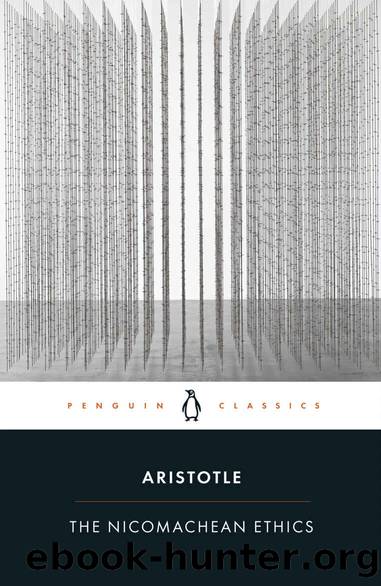The Nicomachean Ethics (Penguin Classics) by Aristotle

Author:Aristotle [Aristotle]
Language: eng
Format: epub
ISBN: 9780141395241
Publisher: Penguin Books Ltd
Published: 2020-04-30T04:00:00+00:00
7
When people have helped others, they seem to love {and care about} the people they helped more than the people who received that help love their benefactors.
Itâs surprising it works that way, and people have tried to figure it out.
So most of them think itâs because helpers are owed a debt 20by the people they helped. âWhat happens with debts is that, while the people who owe the debt would like their creditors to cease to exist, the lenders take great care to make sure that their debtors stay alive; and in much the same way, when people have been helpful to others they want the people they helped to stay alive long enough to return the favour, whereas the people 25they helped arenât so concerned about paying them back.â
âA scoundrelâs view35 of things!â Epicharmus might say about that claim. But true to human character. Most people are inclined to forget and are more interested in being helped than in doing good for others.
And yet, maybe the reason is deeper in nature. Maybe itâs not 30like the lender case. After all, lenders donât actually love {or care about} their debtors. They only want them to survive so they can collect the debt. But people whoâve helped others actually care about, and love, the people theyâve helped, even if theyâre not useful to them in any way and are unlikely ever to be so in the future.
The same thing happens with craftsmen: every craftsman loves his own work, {his own creation}, more than the work 35would love him back if it came to life. And it probably happens 1168amost of all with poets. They just adore their own poems and plays; love them like their own children.
So it seems that something similar is also going on with people whoâve helped out others. The person that theyâve helped is their creation, {their handiwork}. So they love that work more than their work loves its creator.
5And the reason for that is that existence is something desirable for everyone; something we all love. But we exist by being actualized. By being alive and by doing. And a creator is actualized, so to speak, in his work. So he loves his work because he loves existence. Thatâs natural. What he is in his capacities, his creation reveals and makes actual.
10Also, if youâve helped someone your action is honourable, so you cherish the person who embodies that fact about you. If youâve been helped, the person who helped you doesnât embody anything honourable of yours. At most they represent a benefit to you, and that gives you less pleasure and is less lovable.
We get pleasure from our activities in the present, from our expectations about the future and our memories of our past. 15But we get most pleasure from our activities, and itâs those that we love the most. So for someone whoâs done something [helpful], their work lasts, because [it was honourable; and] whatâs honourable endures. For the person who received that help, the usefulness of it is soon gone.
Download
This site does not store any files on its server. We only index and link to content provided by other sites. Please contact the content providers to delete copyright contents if any and email us, we'll remove relevant links or contents immediately.
The remains of the day by Kazuo Ishiguro(8910)
Tools of Titans by Timothy Ferriss(8329)
Giovanni's Room by James Baldwin(7276)
The Black Swan by Nassim Nicholas Taleb(7072)
Inner Engineering: A Yogi's Guide to Joy by Sadhguru(6765)
The Way of Zen by Alan W. Watts(6566)
Asking the Right Questions: A Guide to Critical Thinking by M. Neil Browne & Stuart M. Keeley(5723)
The Power of Now: A Guide to Spiritual Enlightenment by Eckhart Tolle(5694)
The Six Wives Of Henry VIII (WOMEN IN HISTORY) by Fraser Antonia(5468)
Astrophysics for People in a Hurry by Neil DeGrasse Tyson(5161)
Housekeeping by Marilynne Robinson(4410)
12 Rules for Life by Jordan B. Peterson(4285)
Double Down (Diary of a Wimpy Kid Book 11) by Jeff Kinney(4247)
The Ethical Slut by Janet W. Hardy(4227)
Skin in the Game by Nassim Nicholas Taleb(4212)
Ikigai by Héctor García & Francesc Miralles(4188)
The Art of Happiness by The Dalai Lama(4104)
Skin in the Game: Hidden Asymmetries in Daily Life by Nassim Nicholas Taleb(3967)
Walking by Henry David Thoreau(3929)
